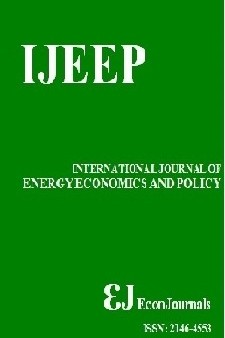Energy Consumption and Economic Growth in OECD Countries
Energy Consumption and Economic Growth in OECD Countries
Energy consumption, Economic growth Energy policy,
- Başlangıç: 2011
- Yayıncı: İlhan ÖZTÜRK
The Relationship between Oil Prices and Exchange Rate in Russia
Tatiana K. BLOKHİNA, Oksana A. KARPENKO, Andrey V. GUİRİNSKİY
Carbon Future Price Return, Oil Future Price Return and Stock Index Future Price Return in the U.S.
Mihail Nikolaevich DUDİN, еvgenia еvgenevna FROLOVA, Julia Alexandrovna ARTEMİEVA, Vitaliy Vasil'evich BEZBAH, Alexey Nikolaevich KİRSANOV
The Impact of Oil Price Changes on Inflation in Pakistan
Positive and Negative Effects of Research and Development
Mohd Shahidan Shaari, Diana Nabila Chau Abdullah, Nur Salimah Binti Alias, Nor Syamimi Mohamed Adnan
Assessing the Future of Energy Security in Egypt
Baher Mohamed ATLAM, Asmaa Melegy RAPİEA
Hamisu Sadi ALİ, Sallahuddin Hassan, Yusuf Ibrahim Kofarmata
Tatyana I. Pototskaya, Alexander P. Katrovskiy, Vladimir I. Chasovskiy
